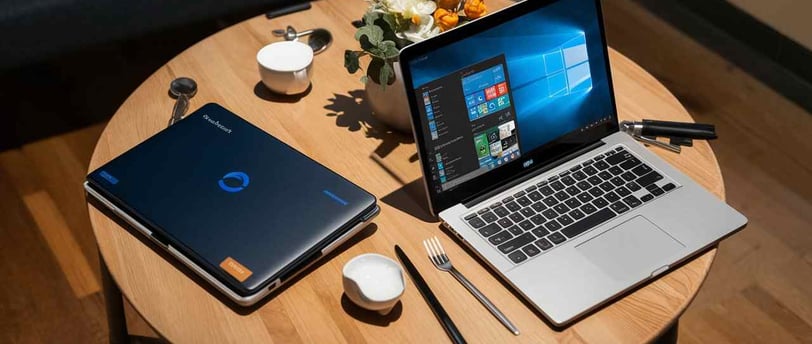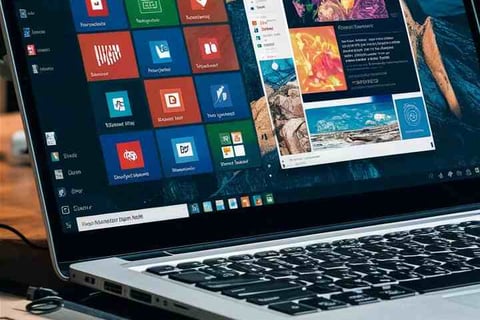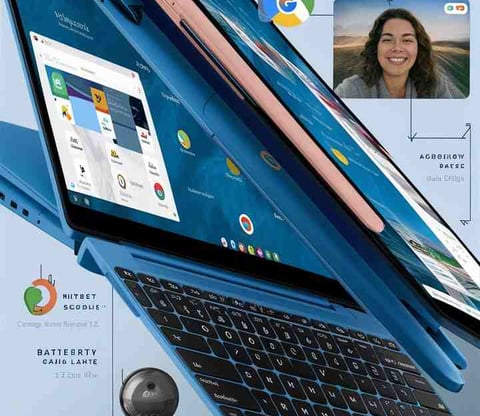Chromebook vs. Windows: Which Is Right for You?
Discover the key differences between Chromebooks and Windows laptops. Explore their performance, software compatibility, security, portability, and price to find the best laptop for your needs.
TECH GUIDE
SK Moniruddin
6/27/20244 min read


Technology is developing quickly, hence selecting the best laptop might be difficult. The two most often used options are Windows PCs and Chromebooks. Each choice is most suitable for a certain user type because of its own set of benefits and drawbacks. So you can choose wisely, we'll examine the main differences between Chromebooks and Windows laptops in this post.
Operating System
Windows PCs and Chromebooks differ mostly in their operating systems. A Google operating system called Chrome OS powers Chromebooks. Mostly, web-based apps are intended for the fast and lightweight software. Windows PCs are powered by the widely used and incredibly adaptable Microsoft Windows operating system. Windows computers can thus execute a huge variety of software programs.
Performance
Many times, Windows machines outperform their competitors. These PCs come in a range of configurations; from entry-level to high-end models with powerful CPUs, plenty of RAM, and specialized graphics cards. For occupations requiring a lot of resources, such as software engineering, film editing, and game creation, Windows PCs excel.
Chromebooks nevertheless frequently come with less powerful hardware. These gadgets' design depends heavily on cloud computing to be both light and energy-efficient. Their strong points are therefore email, internet surfing, and word processing; more sophisticated applications may be a challenge.


Software Compatibility
One excellent characteristic of Windows PCs is the software versatility. Microsoft Office and Adobe Creative Suite are only two examples of the many specialty industry products created only for Windows. Students and professionals who use specialist software for their study or work will find Windows laptops to be excellent.
With Chromebooks, the only sources to obtain Android apps are the Google Play Store and the Chrome Web Store; Chromebooks have fewer software options. Though Google Docs, Microsoft Office (online versions), and many more tools are available, the number of accessible work tools is now far lower than it is on Windows. Chromebooks could be a good choice for those who are already familiar with Google products and who use their laptops for web-based work.
Security
Concerning security, Chromebooks shine. Among the security tools included into Chrome OS are verified start, sandboxing, and automatic updates. The technology has successfully blocked off possible threats including viruses and malware. Also, Chromebooks store most of their data in the cloud, so losing data because of a hardware failure is much less possible.
Owing to their extensive use, viruses and malware are more frequent on Windows PCs even with their enhanced protection features. Windows PCs may be much safer, though, with reliable security software and routine update installation. It takes ongoing attention to detail and current security software.
Portability and Battery Life
Noted for their mobility and long battery lives are Chromebooks. Their lightweight design and energy-efficient characteristics allow them to run continuously for a whole day on a single charge. Workers and students in need of a reliable mobile device would profit much from these.
The configuration you choose greatly affects your Windows laptop's battery life and mobility. Ultrabooks are equally portable as Chromebooks and are other lightweight PCs available. Sometimes the higher power consumption of high-performance Windows PCs fitted with new technologies results in a shorter battery life. A Chromebook is a wise option if mobility and battery life are important to the user.
Price
A lot of individuals base their laptop selection mostly on pricing. Chromebooks are less expensive than Windows laptops.For a few hundred dollars, Chromebooks are an excellent choice for families, couples on a tight budget, and anybody else who needs an extra computer.
Although they vary range in price, Windows laptops, especially ones with more advanced hardware, can be very expensive. Relievingly, most people's needs can be satisfied with Windows PCs without going over budget.
User Experience and Interface
Clear and simple rules direct the Chromebook user experience. Because Chrome OS is so simple and elegant, it is approachable for those who aren't very computer savvy. Customers that are already quite involved in the Google ecosystem will consider the inclusion of Google services like Gmail, Google Drive, and Google Photos to be a benefit.
The user interface (UI) of Windows is sophisticated and configuratable. There are many of customizing possibilities and a user interface that most people can identify. When Windows laptops can interface with other tools and devices, they become more productive and useful. Should you want a more configurable and potent environment, go with Windows.
Conclusion
Choice between a Chromebook and a Windows laptop will ultimately depend on need and personal preference. Anyone seeking a reasonably priced laptop with excellent battery life, mobility, and security should definitely check out Chromebooks. Those that use web-based tools often find them helpful. Students, occasional users, and heavy Google service users will find these options to be perfect as they make routine chores easier.
Windows workstations are, however, better suited for people who like independence, software flexibility, and strong hardware. Fans, experts, and those with jobs need a lot of resources frequently purchase their goods.
versus last, there are different benefits to Windows PCs versus Chromebooks. Selecting the best laptop for your needs and way of life may be easy if you take the time to rank the qualities that are most important to you.


